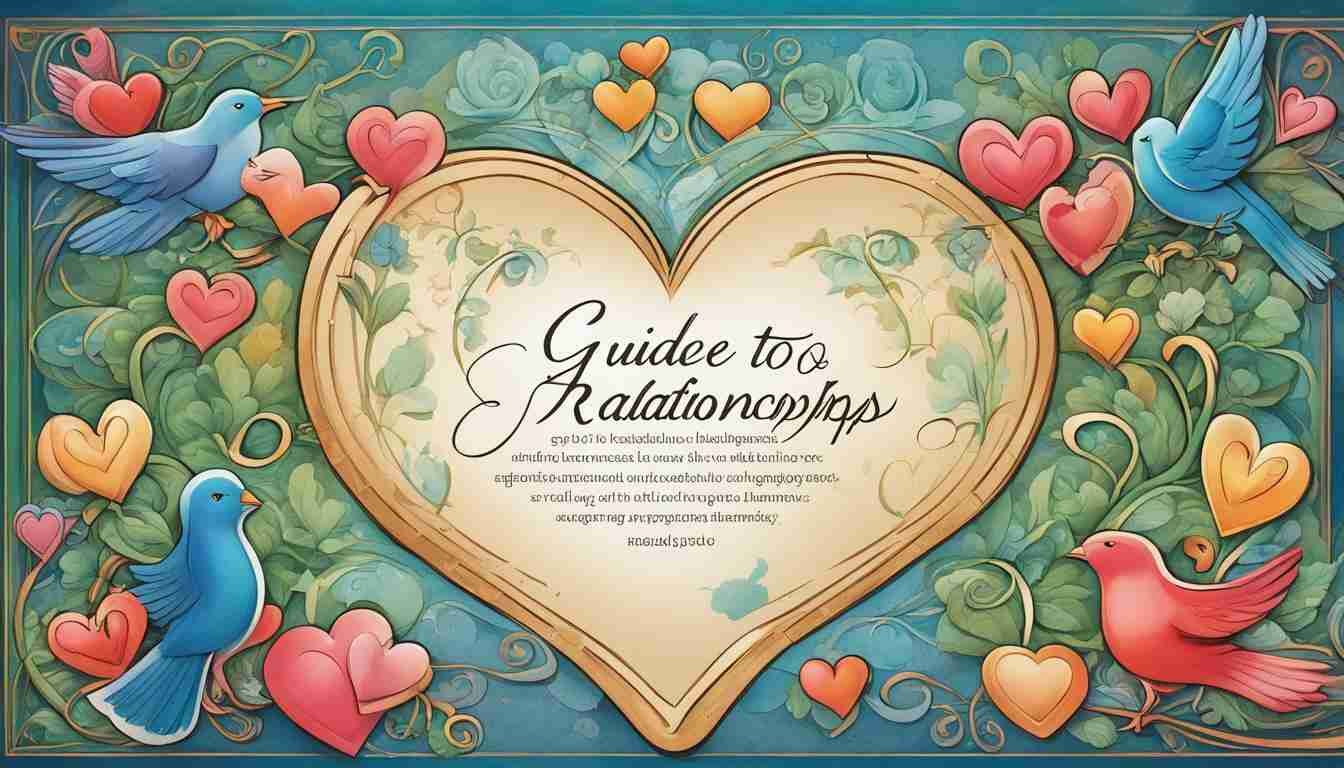Relationships are an essential component of our lives, and achieving happiness in our relationships is crucial for our overall well-being. Communication is the foundation of any healthy relationship, and there are several tips and strategies that can help you to maintain a happy and fulfilling relationship.
Key Takeaways
- Effective communication is the cornerstone of a successful relationship.
- Building trust and maintaining emotional connection are key to relationship happiness.
- Resolving conflicts constructively and prioritizing quality time together are essential for healthy relationships.
Building Trust in a Relationship
Trust is the cornerstone of any healthy relationship. It’s an essential building block that allows partners to feel secure and respected. Without trust, relationships can quickly fall apart, causing emotional pain and turmoil for all parties involved. Here are some relationship advice and strategies for building trust in your partnership:
Open Communication
Communication is key in establishing trust in any relationship. Talk openly and honestly with your partner about your thoughts, feelings, and expectations. Be mindful of your body language and tone of voice during conversations to avoid sending mixed signals. Encourage your partner to do the same and listen actively to their feedback.
Consistency
Consistency is crucial in building trust. Follow through on your promises, no matter how small they may seem. If you commit to doing something, make sure you stick to it. This helps your partner know that you are dependable and reliable.
Honesty
Honesty is the best policy, especially in relationships. It can be tempting to avoid difficult conversations or hide the truth to spare your partner’s feelings. However, avoidance and dishonesty erode trust over time. Be honest and upfront with your partner, even when it’s uncomfortable.
Integrity
Integrity is closely tied to honesty and consistency. It means having strong values and living by them. Acting with integrity builds trust with your partner, as they know they can count on you to do the right thing, even when no one is watching.
| TIP: | Trust takes time to build, so be patient and consistent in your efforts. |
|---|
Building trust is an ongoing process that requires effort and commitment from both partners. By practicing open communication, consistency, honesty, and integrity, you can establish a foundation of trust that will strengthen your relationship over time.
Effective Communication in Relationships
Effective communication is the cornerstone of any healthy relationship. It allows partners to express their feelings, needs, and desires in a constructive way while also fostering intimacy and trust. Since communication is a two-way street, both partners need to actively participate and be willing to listen and compromise. Here are some essential tips for better communication in relationships.
Active Listening
To communicate effectively, you must first be able to listen actively. This means paying attention to your partner, hearing what they say, and understanding their perspective. Avoid interrupting or jumping to conclusions and allow them to express themselves fully before responding.
It’s also essential to show empathy and validate your partner’s feelings. This means acknowledging and accepting their emotions, even if you don’t necessarily agree with them. This helps your partner feel heard and understood, which lays the foundation for open and honest communication.
Expressing Emotions
Once you’ve listened actively, it’s time to express your own emotions and needs. It’s important to use “I” statements, focusing on your feelings and experiences rather than attacking or blaming your partner. For example, “I feel hurt when you cancel plans without letting me know” is more effective than “You always cancel plans and never care about my feelings.”
It’s also essential to avoid criticism, defensiveness, and contempt. These behaviors can damage communication and lead to further misunderstandings and conflict. Instead, be respectful, patient, and open-minded.
Resolving Conflicts
Although conflicts are inevitable in any relationship, how you handle them can make all the difference. To resolve conflicts effectively, it’s crucial to stay calm and focused on finding a solution rather than assigning blame or winning an argument.
Try to understand your partner’s perspective and look for common ground. Use active listening skills to communicate your own needs and feelings, and work together to find a compromise that satisfies both partners.
Remember, communication is an ongoing process that requires effort and commitment from both partners. By actively listening, expressing emotions, and resolving conflicts constructively, you can foster a deep, meaningful connection with your partner and achieve long-lasting relationship happiness.
Setting and Achieving Relationship Goals
Setting relationship goals is an effective way to enhance satisfaction in a relationship. Goals provide a focus and direction for a couple, which can increase their sense of purpose and commitment to each other. When setting personal and shared goals, it’s important to communicate openly and honestly with each other to ensure that everyone is on the same page.
Here are some examples of relationship goals to get started:
- Improve communication: This can involve practicing active listening, reducing distractions during conversations, and expressing emotions more openly and constructively.
- Strengthen trust: This involves building a sense of security and reliability with each other. It can be achieved through honesty, transparency, and consistency in actions and behaviors.
- Enhance intimacy: This can involve nurturing emotional and physical connections through communication, non-sexual touch, and shared experiences.
- Explore new activities: This involves trying out new experiences together, such as a new hobby or travelling to a new destination.
Once you have identified your goals, it’s important to develop a plan to achieve them. This plan should involve specific action steps and a timeline for achieving them. Review your goals and progress regularly, and make any necessary adjustments to ensure that you are both happy and fulfilled.
By setting and achieving relationship goals, couples can enhance their sense of connection and satisfaction in the relationship. Remember, the journey towards achieving these goals is just as important as the end result.
Maintaining Emotional Connection
In any relationship, maintaining an emotional connection is crucial to ensuring long-term love and happiness. Intimacy and emotional connection are key components of a happy relationship, and nurturing them requires dedication and effort.
One of the first steps in creating and maintaining an emotional connection is to cultivate open and honest communication. This means allowing yourself to be vulnerable, sharing your thoughts and feelings with your partner, and actively listening to their point of view. Through open communication, you can build trust and deepen your understanding of one another, strengthening your emotional connection.
Another way to nurture emotional intimacy is by engaging in shared experiences that bring you closer together. This could include taking trips, trying new activities, or simply spending quality time together on a regular basis. The key is to find activities that you both enjoy and that allow you to connect on a deeper level.
It is also essential to express love and affection regularly. This can include simple gestures like holding hands, kissing, or hugging, as well as more intentional acts of love like surprise gifts or love notes. These acts of love help to reinforce the emotional connection between partners and remind each other of the love that they share.
Remember, maintaining an emotional connection requires ongoing effort and attention. Taking the time to communicate openly, engage in shared experiences, and express love and affection regularly can go a long way in fostering intimacy and deepening your emotional connection. By making these efforts, you can create a happy, long-lasting relationship that brings you both love and happiness.
Balancing Independence and Togetherness
One of the key factors in maintaining a happy relationship is striking a balance between independence and togetherness. It’s important to maintain your individuality while building a strong bond with your partner.
Here are some healthy relationship tips:
| Tip | Explanation |
|---|---|
| Communicate your needs | It’s important to communicate your needs for alone time. Set boundaries and make sure your partner understands your need for independence. |
| Nurture common interests | Developing common interests is a great way to bond while maintaining individuality. Find activities you both enjoy and make them a regular part of your routine. |
| Encourage personal growth | Support your partner’s personal goals and encourage them to pursue their interests. This will not only help them grow as an individual but will also strengthen your relationship in the long run. |
Remember, a healthy relationship is about finding a balance that works for both partners. By nurturing your individuality and your bond with your partner, you can maintain a happy relationship.
Resolving Conflict and Managing Differences
Conflict is inevitable in any relationship. It’s how you handle those conflicts that determines the health of your relationship. Here are some healthy relationship tips for resolving conflicts and managing differences:
1. Communicate Openly and Honestly
Effective communication is essential for resolving conflicts. Make sure you are both actively listening and expressing your emotions without attacking each other. Use “I” statements instead of “You” statements to avoid blame. Try to see things from your partner’s perspective and find common ground.
2. Take a Break
When conflicts get heated, it’s essential to take a break. Sometimes, stepping away from the situation can help you gain perspective and come back with a cooler head. Take a walk, meditate, or engage in a calming activity to help you decompress.
3. Find a Compromise
Compromise is key to resolving conflicts. It’s sometimes necessary to find a middle ground that works for both of you. Practice empathy and try to understand your partner’s needs and wants. Look for creative solutions that meet both of your needs.
4. Seek Outside Help
If you find yourselves struggling to resolve conflicts, don’t be afraid to seek outside help. A relationship counselor or therapist can help you navigate difficult issues and provide tools for improving communication and managing conflict.
Remember, conflict doesn’t have to be a bad thing. Use it as an opportunity to strengthen your relationship and find a deeper understanding of each other.
Prioritizing Quality Time Together
Spending quality time together is critical to maintaining a happy relationship. In today’s busy world, it is essential to prioritize shared activities for maintaining a strong bond with your partner. Making a conscious effort to spend quality time together signifies that your relationship is important to you and that you value the time you spend together.
To prioritize quality time, start with planning regular date nights. Make this a priority in your schedule and stick to it. Choose activities that you both enjoy doing together, such as cooking, watching movies, or going for a walk. It doesn’t matter what you do as long as it is something that you both enjoy.
Another way to prioritize quality time is by unplugging from technology. Turn off your phones and other devices to avoid distractions and spend uninterrupted time together. This will help you to be present in the moment and enjoy each other’s company.
| Healthy Relationship Tip: | Make a conscious effort to spend quality time together on a regular basis to strengthen your bond. |
|---|---|
| Maintaining a Happy Relationship: | Planning date nights, choosing shared activities, and unplugging from technology will help you prioritize quality time. |
Nurturing Emotional and Physical Intimacy
Emotional and physical intimacy are essential components of a happy relationship. However, maintaining these aspects of a relationship can be challenging, especially as the relationship evolves over time. Here are some tips for cultivating intimacy and enhancing relationship satisfaction:
- Communicate regularly: Clear communication is essential for maintaining emotional and physical intimacy. Make time to talk with your partner, share your feelings, and listen actively to their concerns.
- Build trust: Trust is the foundation of a healthy relationship. Make sure you are honest and reliable and keep your promises. If you make a mistake, own up to it, and do your best to make things right.
- Show physical affection: Physical touch is a powerful way to nurture intimacy in a relationship. Make time for cuddling, holding hands, and other forms of physical contact that promote closeness.
- Practice empathy: Empathy is the ability to understand and share your partner’s feelings. When you practice empathy, you create a deeper emotional connection and strengthen your bond.
- Prioritize intimacy: Make time for intimacy in your relationship, both emotional and physical. Set aside time for date nights, weekend getaways, and other shared experiences that allow you to connect on a deeper level.
- Be open-minded: Be willing to try new things, both in and out of the bedroom. Experimenting with different activities and experiences can help you discover new ways to nurture intimacy and enhance your relationship satisfaction.
Remember, emotional and physical intimacy cannot be forced or rushed. It takes time, effort, and patience to build and maintain these aspects of a relationship. However, by implementing these tips and prioritizing intimacy, you can create a deeper, more satisfying connection with your partner and enjoy a happier, more fulfilling relationship.
Cultivating Gratitude and Appreciation
In any relationship, expressing gratitude and appreciation is a key component to maintaining a happy and healthy partnership. It is important to acknowledge the efforts and contributions of your partner and to be thankful for them.
When you take the time to express gratitude, it helps to create a positive atmosphere in the relationship. It allows both partners to feel appreciated and valued, which can lead to deeper emotional connections and enhanced relationship satisfaction.
One way to cultivate gratitude is to make a habit of expressing appreciation on a regular basis. This can be as simple as saying “thank you” when your partner does something for you or leaving a note expressing your gratitude.
Another way to create a culture of appreciation is to actively look for things to be grateful for in your partner. Take notice of the little things they do and the positive qualities they possess. Sharing these observations with your partner can help to boost their self-esteem and strengthen your relationship.
By cultivating gratitude and appreciation, you can enhance your relationship satisfaction and maintain a happy partnership for the long term.
Overcoming Relationship Challenges
Relationships are not always smooth sailing, and it’s natural for couples to face challenges. However, the way you handle those challenges can make or break your relationship. Here are some healthy relationship tips and relationship advice for overcoming those tough times:
Practice Empathy and Active Listening
It’s essential to actively listen to your partner and try to understand their perspective. When you practice empathy, you can better navigate disagreements and conflicts. Try putting yourself in their shoes, and ask clarifying questions to ensure you understand their position.
Find Compromise and Common Ground
Compromise is vital in any relationship, and finding common ground can help you come to a resolution that works for both parties. Consider what you can do to meet halfway and work towards a solution together. Remember, it’s not about winning or losing, but finding a solution that works for both of you.
Seek Professional Help if Necessary
If you’re facing significant challenges in your relationship, consider seeking the help of a professional. A counselor or therapist can help you navigate complex issues and provide new perspectives on your situation. There’s no shame in seeking help, and it can be a positive step towards a healthier relationship.
Remember, every relationship has its ups and downs. By implementing healthy relationship tips and relationship advice, you can overcome challenges and strengthen your bond with your partner.
Conclusion
Achieving long-lasting relationship happiness is crucial for overall well-being. By implementing the tips and strategies outlined in this article, you can strengthen your relationship and enhance your satisfaction. Remember to prioritize effective communication, build trust, and maintain emotional connection.
Balancing independence and togetherness, prioritizing quality time together, and resolving conflicts constructively are also pivotal in nurturing relationship happiness. Don’t forget to express gratitude and appreciation and cultivate emotional and physical intimacy regularly.
Overcoming relationship challenges may be difficult, but with empathy and understanding, you can emerge stronger and more connected with your partner.
Take Action for Long-lasting Relationship Happiness
Prioritize your relationship happiness, now and always. Invest time, effort, and energy into creating a strong, healthy, and loving bond with your partner. With commitment and dedication, you can achieve long-lasting relationship happiness and a fulfilling life together.
Remember, a happy relationship is essential for a happy life. Start implementing these tips and strategies today and enjoy the benefits of a strong and loving relationship.
FAQ
Q: Can these tips and strategies be applied to any type of relationship?
A: Yes, the tips and strategies discussed in this article can be applied to any type of relationship, whether it’s a romantic partnership, friendship, or family relationship. Effective communication, trust-building, and maintaining emotional connection are essential in all types of relationships.
Q: How long does it take to build trust in a relationship?
A: Building trust in a relationship is a gradual process that can vary depending on the individuals involved and the specific circumstances. It requires consistent effort, open communication, and demonstrated reliability. While trust cannot be built overnight, with time and commitment, it can be developed and strengthened.
Q: What if my partner and I have different communication styles?
A: It’s common for individuals to have different communication styles in a relationship. The key is to recognize and understand these differences, and then find ways to bridge the gap. Practice active listening, express your emotions clearly, and be open to compromise. Communication is a skill that can be improved with practice and patience.
Q: How do I set realistic relationship goals?
A: Setting realistic relationship goals involves open and honest communication with your partner. Discuss your individual and shared aspirations, and identify areas of growth and improvement. It’s important to ensure that your goals are achievable and aligned with both partners’ values and desires.
Q: What if conflicts in my relationship seem impossible to resolve?
A: Conflicts are a natural part of any relationship, and it’s normal for some conflicts to be more challenging to resolve than others. In such cases, seeking professional help from a couples therapist or relationship counselor can provide valuable guidance and support. They can help you navigate through conflicts and find constructive solutions.
Q: How can I make quality time a priority in my busy schedule?
A: Making quality time a priority in a busy schedule requires intentional planning and commitment. Schedule regular date nights or dedicated time for shared activities. Put away distractions, such as phones or work-related tasks, and focus on being fully present with your partner.
Q: How important is physical intimacy in a relationship?
A: Physical intimacy plays a crucial role in many relationships, as it helps foster emotional connection and bonding. However, the importance of physical intimacy can vary for each individual and relationship. It’s essential to have open and honest conversations with your partner about your needs and desires regarding physical intimacy.
Q: How can I overcome challenges in my relationship?
A: Overcoming challenges in a relationship requires open communication, empathy, and a willingness to work together. It’s important to address challenges directly, listen to each other’s perspectives, and seek mutually acceptable solutions. Building a strong foundation of trust and understanding can help navigate through difficult times.
Q: What can I do if I feel my relationship is becoming stagnant?
A: If you feel your relationship is becoming stagnant, it’s time to introduce new experiences and activities. Explore new hobbies together, plan adventures, or take a trip. Remember to communicate openly about your desires for growth and change in the relationship.





